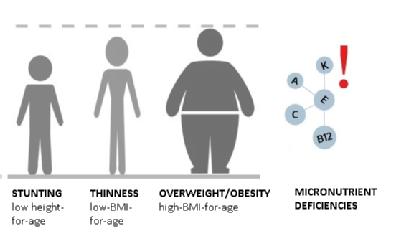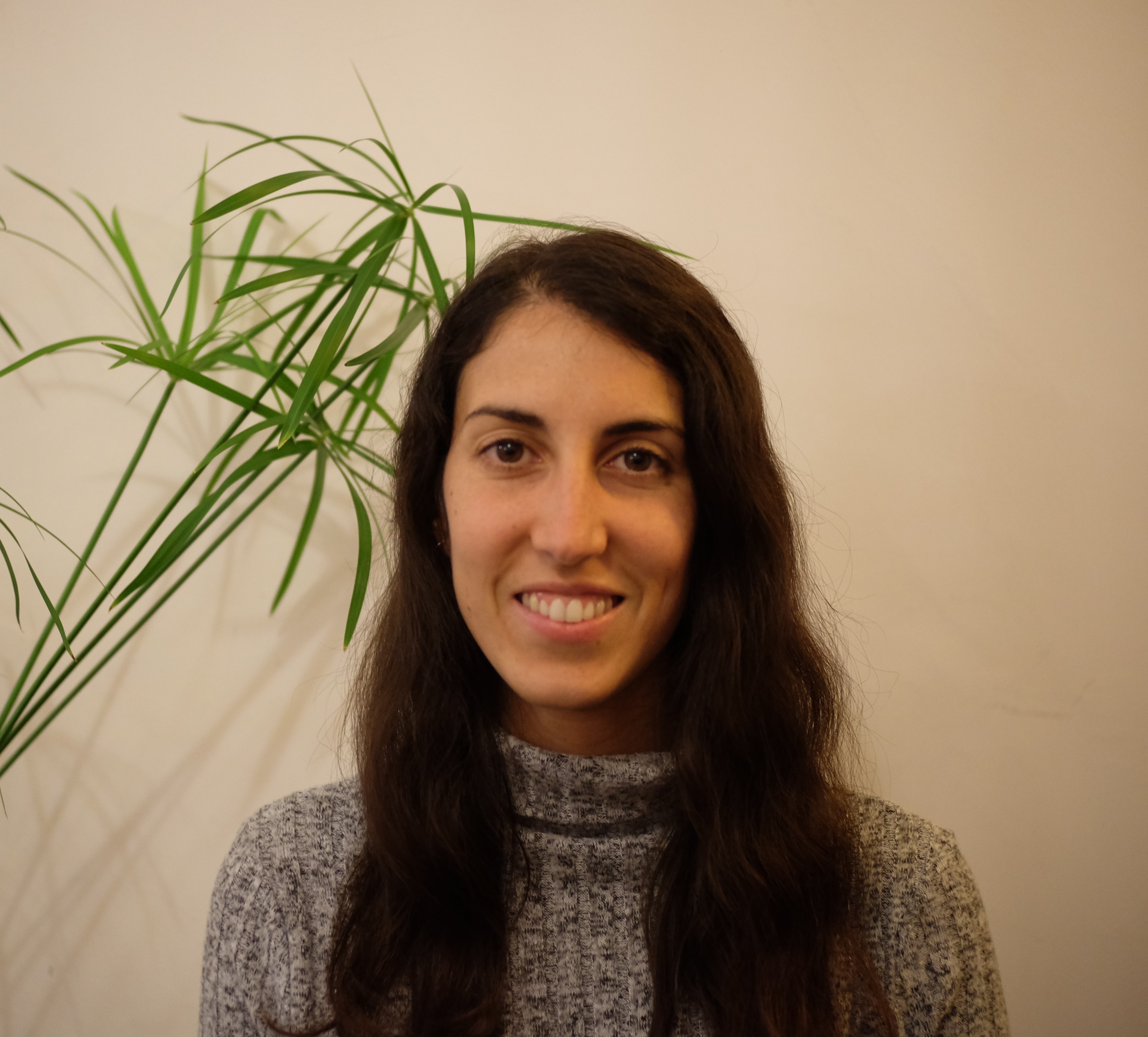Sara Estecha Querol
PhD thesis title:
Malnutrition among South Asian adolescents: A mixed-methods study
Find my thesis available hereLink opens in a new window.
About my PhD research:
Malnutrition is a highly prevalent and persistent problem in developing countries, and its consequences for chronic disease management come at a high human and economic cost. While undernutrition and micronutrient deficiency rates remain highly concerning in South Asia, this region faces the new challenge of overnutrition. Adolescence provides a window of opportunity for improving nutrition. Yet, the burden of malnutrition among adolescents remains unattended and insufficiently investigated.

Figure 1: Forms of adolescent malnutrition
For more information about my research topic, listen to my podcast below
| Download |
This doctoral thesis aimed to produce a nuanced understanding of malnutrition among South Asian adolescents and identify factors improving or worsening malnutrition among Pakistani adolescents attending schools. A mixed-methods approach was used to address the overall aim of the thesis. This PhD project is located within the NIHR Global Health Research Unit on improving Health in SlumsLink opens in a new window.
Firstly, a conceptual framework was developed and a scoping review was conducted to guide this research. The scoping review summarise what is known about adolescent undernutrition and micronutrient deficiencies in South Asia. Uneven geographical distirbution of the literature was found in this scoping review. In addition, more studies are required to investigate malnutrition among adolescent living in slums and out-of-school adolescents. Other research methods such as longitudinal, interventional and qualitative approches should be used to capture the complexity of malnutrition.
The secondary quantitative data analysis calculated the burden of malnutrition among schooled adolescents living in the eight South Asian countries: stunting was 13%, thinness 11% and overweight 11% at the South Asian level. Factors associated with malnutrition were age, hygine behaviours, social support, tobacco and sedentary behaviours.
The qualitative study used photodiaries and interviews to explore awareness and perspectives of malnutrition among schooled adolescents living in a Karachi slum, PakistanLink opens in a new window. Food consistently underpinned participants’ narratives and photodiaries which was reflected in how they made sense of malnutrition: overnutrition was an excess of food and undernutrition was a lack of food.



Figure 2: participants' photodiaries
Finally, the findings from both approaches were interpreted and connected by discussing to what extent and in what ways they relate to each other and produce a complete understanding of adolescent malnutrition in South Asia. The thesis suggested future work addressing adolescent malnutrition in South Asia, some of which are relevant to Pakistan and slum settings. Ultimately, this thesis developed several recommendations for policymakers and healthcare organisations delivering adolescent health and nutrition actions in South Asia.
As part of the dissemination of my PhD thesis findings, I Link opens in a new decided to run two public engagement workshops with high school adolescents from rural Spain. The purpose of these workshops was manifold: 1) to inspire adolescents to become the researchers of the future; 2) to raise awareness of adolescent malnutrition (social impact); 3) to share what I do; and 4) to improve my skills (professional development). Find out more about this experience, check the case studyLink opens in a new window on the Warwick Institute of Engagement website.
PhD publications:
▪ Estecha-Querol, S.; Zaidi, S.K.Z.; Al-Khudairy, L.; Gill, P.; Iqbal, R. “Good Food Causes Good Effects and Bad Food Causes Bad Effects”: Awareness, Meanings and Perceptions of Malnutrition among Pakistani Adolescents Living in Slums through Photodiaries and Interviews. Nutrients, 15, 33. December 2022. DOI: https://doi.org/10.3390/nu15010033
▪ Estecha Querol S, Iqbal R, Kudrna L, Al-Khudairy L, Gill P. The Double Burden of Malnutrition and Associated Factors among South Asian Adolescents: Findings from the Global School-Based Student Health Survey. Nutrients 13, 2867. August 2021. DOI: 10.3390/nu13082867Link opens in a new window
▪ Estecha Querol S, Gill P, Iqbal R, Kletter M, Ozdemir N, Al-Khudairy L. Adolescent undernutrition in South Asia: a scoping review. Nutrition Research Reviews. April 2021. DOI: 10.1017/S0954422421000068Link opens in a new window
▪ Estecha Querol S, Al-Khudairy L, Iqbal R, Gill P. Application of the photovoice method to promote partnerships and engagement with the community in a slum in Pakistan. Ann Nutr Metab 76(suppl 4), Page 105. October 2020. DOI: 10.1159/000511826Link opens in a new window
▪ Estecha Querol S, Al-Khudairy L, Iqbal R, Johnson S, Gill P. Adolescent undernutrition in South Asia: a scoping review protocol. BMJ Open 10:e031955. January 2020. DOI: 10.1136/bmjopen-2019-031955Link opens in a new window
All my peer-reviewed publications can be found hereLink opens in a new window
Awards:
Recognition Award in Natural Life Science category at the 10th UK Doctoral Research Awards competition: hereLink opens in a new windowIn the media:
I ran a Public Engagement Workshop to raise malnutrition awareness among students at my previous high school in May 2022. I was interviewed live by the local radioLink opens in a new window to talk about this workshop and it was also featured in another local newspaper and TVLink opens in a new window.
As part of the International Day of Women and Girls in Science 2022, I ran a Public Engagement Workshop at my previous high school in February 2022. I was interviewed live by the local radioLink opens in a new window to talk about this experience and it was also featured in another local newspaperLink opens in a new window.
NIHR Global Health Research news and updates featured my podcast in the June 2021 newsletter: hereLink opens in a new window.
As part of the NIHR Women in Science Campaign 2021, I was asked some questions on how my journey in Science and Health Research began: hereLink opens in a new window.
Previous studies:
MPhil in Health Inequalities, Institute of Psychology, Health and Society at the University of Liverpool, UK (2016-2017)
MSc Public Health, Faculty of Medicine at the University of Zaragoza, Spain (2012-2013)
BSc Human Nutrition and Dietetics, Faculty of Health Science and Sport at the University of Zaragoza, Spain (2019-2013)

Contact: saraestechaquerol@hotmail.com
Also on TwitterLink opens in a new window, ResearchGateLink opens in a new window, and LinkedInLink opens in a new window
ORCIDLink opens in a new window
My academic CVLink opens in a new window
Research interests:
Global health nutrition, the burden of malnutrition, adolescent health, food insecurity, health inequalities, health policy agenda, participatory action research methods, mixed-methods.
Supervisors:
Professor Paramjit GillLink opens in a new window, Dr Lena Al-KhudairyLink opens in a new window
